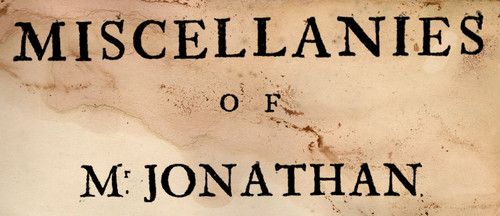
unearths some literary gems.
From Stolen Words, by Thomas Mallon:
[This scholarly but lively, witty work about plagiarism, and how it became the modern concept we recognize over the course of the 18th and 19th centuries, sits on my imaginary shelf next to Marginalia by H. J. Jackson (who is cited in this book, because her buddy Coleridge figures heavily not only in the history of marginalia but also in the history of plagiarism).]
***
To some extent every writer's desk top is like a Ouija board, his pen pushed across it by whatever literary ghost he's just entertained.
***
It's...common for the novelist, particularly the young one, to create his characters out of himself. What's odd, and what may have been true in Sterne's middle-aged case, is taking the opportunity to make oneself out of one's characters.
***
Originality...set itself down as a cardinal literary virtue sometime in the middle of the eighteenth century and has never since gotten up.
***
[Coleridge] would likely have denied that what he was really giving...was not so much an account of what Sterne's brain went through when musing upon female anatomy as of what his own underwent in the presence of German metaphysics.
***
One can barely conduct a study of plagiarism amid the deafening sound of literary pots roaring at literary kettles.
***
Coleridge: "I regard truth as a divine ventriloquist."
***
Charles Reade: "A man's life is like those geographical fragments children learn 'the contiguous countries' by. The pieces are a puzzle; but put them together carefully, and lo! they are a map."
***
The preface to A Simpleton has Reade blustering: "All fiction, worth a button, is founded on facts.... I rarely write a novel without milking about two hundred heterogeneous cows into my pail."
Most novelists perform the same chore less loudly on a smaller herd.
***
Take a writer not quite so beyond criticism, and we tend, upon spotting historical lumps in the narrative gravy, to object.
***
By mid-March things were sufficiently complicated for an academic to step in.
***
The four volumes of Uber Land und Meer that were brought up from the lower depths of the New York Public Library together weigh more than an IBM Selectric typewriter and are so covered with dust that you have to imagine the Bismarckian Hausfrauen who subscribed to the unbound originals sternly clucking at their current untidiness.



